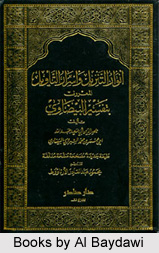 Islamic Theologians have contributed immensely to the growth of Islamic Philosophy. The various theologians have adopted varying approaches to the development of Islamic philosophy which in turn has greatly enriched the scope and dimensions of the subject. Some of the important theologians are discussed below.
Islamic Theologians have contributed immensely to the growth of Islamic Philosophy. The various theologians have adopted varying approaches to the development of Islamic philosophy which in turn has greatly enriched the scope and dimensions of the subject. Some of the important theologians are discussed below.
Al Baydawi
He was born near Shiraz in Persia, and apparently ended his life as chief Qadi there. He had a reputation for piety and asceticism, but his outstanding gift was his ability to select what was best in the works of previous scholars and to summarize it in an acceptable form. His greatest work is his commentary on the Holy Quran which is based mainly on that of Az Zamakh Shari. He was a noted theologian of the time, and a comprehensive account of his views, in the same line as Al Ghazali`s Golden Mean, has been published in Arabic. The topics covered are roughly similar to the Muhassal of Fakhr ad din ar Razi, though more philosophical in tone. In matters of jurisprudence, Al Baydawi was a Shafite.
Hafiz Ad Dinab ul Barakatan Nasafi
He was born near Bukhara and apparently studied there under a teacher who died in 1244. He went on to become a teacher of Jurisprudence according to the Hanafite Tradition. Among his lesser works is the Pillar of Creed, along with a Commentary on it. Its doctrines are very similar to those of The Articles of Belief by Najm ad Din an Nasafi, but it is about four times the length. It is noteworthy however, that it says less about epistemology than the shorter creed, but the author may have felt that philosophical discussions were out of place in a creed. He died on his way back from Baghdad.
Al Iji
Given the honorific title of Adud ad Din, Al Iji was born near Shiraz after 1280, and educated there under a pupil of a pupil of Al Baydawi. Most of his life is said to have been spent as a judge in the capital of the Il Khans, Sultaniyya. However, in his latter years he was again in the neighbourhood of Shiraz. Unfortunately he became embroiled with a local governor who was in process of attaining a position of semi-independence, and died in prison in 1355. In theology he is known chiefly for two works. One is the Mawaqif, a comprehensive work arranged in roughly the same way as the Muhassal of Ar Razi, but devoting more space to the philosophical preliminaries (two-thirds as against a half). The other work is a creed, usually known as the Adudiyya, which is quite short.
Al Taftazani
Taftazani was born in Khorasan and is said to have been a pupil of Al Iji. He is known to have been present at Herat, and also at one of the minor Mongol courts. When this whole region came under Tamarlane, al Taftazani was stationed for a time at Sarakhs in the centre of Khorasan, and then moved to the court at Samarqand. He is best known for his commentary on The Articles Belief by Najm ad Din an Nasafi, which for centuries was one of the chief textbooks of theology. The curious thing about this is that, though the creed is Maturidite, al Taftazani is usually held to have been an Asharite. The reason is probably that he taught in a region where Maturidite views were dominant. He expresses himself carefully, but there are a number of points where it is clear that he disagreed with the text he was commenting on.
Al Jurjani
Also known as Sayyid Ash Sharif (1340-1413), Jurjani was born in Gurgan at the south-east corner of the Caspian Sea, and studied in Herat, in Kirman (on the Persian Gulf) and in Egypt, besides visiting Constantinople. He was a friend of Al Taftazani, and through the latter obtained a professorship in Shiraz about 1377. After the conquest of Shiraz he went to Tamarlane`s court at Samarqand, and in a celebrated debate showed himself superior to Al Taftazani. He returned to Shiraz after Timur`s death in 1405. Many works in many fields of study were produced by him. Theologically the most important was his commentary on the Mawaqif of al Iji, where his interest in philosophical questions was given full scope.

As Sanusi
Sanusi was born at Temsen in the west of Algeria, and spent most of his life there. He is said to be an Asharite in theology, and was also a Sufi, but first and foremost he is a philosopher. The work which has attracted most attention is a short creed often called the `Sanusiyya,` which has been popular with African Muslims, and has also been translated into French and German. It is much more philosophical than the short creed of al Iji, and begins, for example, by asserting that every believer must know twenty attributes necessary in respect of God and twenty attributes impossible for him. Since among the twenty attributes necessary for God are seven `attributes of forms` which have to be distinguished from seven very similar `attributes pertaining to forms`, it is clear that the average believer is expected to be a philosopher.
Ad Dawwani
Dawwani came from a district some fifty miles west of Shiraz, and became a judge and professor in the latter city. Numerous works are extant on philosophical, theological and mystical subjects, including commentaries on some of the works of al Iji and al Jurjani. There was perhaps a certain local piety in the continued study of these works at Shiraz. Ad Dawwani is said to have become an Imamite Shiite, but he certainly began as an Asharite. His commentary on the creed of al Iji (article on the imamate of Abu Bakr), and the work of Nasir ad Din at Tusi commented on by him is philosophical and has nothing of Shiite dogmatics.
Birgevi
Birgevi was a Turkish scholar from north-west Asia Minor. He completed his education in Istanbul, and eventually taught a college at the little town of Birgi in the province of Smyrna. He stood boldly for the strict and faithful observance of the Sharia, and considered, for example, that it was wrong to teach the Quran for money. His staunch righteousness and the popularity of his preaching gained him a huge following among the common people. A creed or statement in Turkish of the principles of religion achieved a wide circulation and had commentaries written on it, but he himself, like many Turks, was largely un-philosophical.
Al Laqani
He was a professor at Al Azhar College in Cairo, and belonged to the Malikite legal rite. He is remembered for a creed in verse called "The Jewel" (Al- Jawhara), which has been the basis of some well-known commentaries. One such was by his son Abd as Salam al Laqani, who was also a professor at Al Azhar. The Jewel is somewhat similar in form to the short creed of As Sanusi.
As Siyalkuti
This man from Sialcot, was an adviser at the court of the Mughal emperor Shah Jahan. He wrote commentaries and glosses on some of the theological works regularly studied in Persia and Egypt, and his writings were so highly thought of that they themselves came to be used as textbooks.
Al Fadali (or Fudali or Faddali)
Fadali was a native of the Delta and professor at Al Azhar in Cairo, who died in 1821. He wrote an exposition of the Islamic faith of medium length which was translated into English by D. B. Macdonald.
Al Bajuri
Also called al Bayjuri, from the Egyptian province of Menouf, he became a professor at Al Azhar and later the rector. Like al Fadali who was one of his teachers he was a Shafiite in law. He was outstanding in his day, but his work consisted mainly in commentaries and glosses, including commentaries on the shorter creed of As Sanusi and the exposition of al Fadali, as well as a gloss on a commentary on the Jewel of al Laqani. These brief notes are far from being a history of theology during this period, yet they give glimpses of what was happening. The "international" character of the discipline is noteworthy, though the scholars move about less than in the centuries before 1258. In spite of the less extensive travelling of scholars, however, important works seem to be known throughout the Sunnite world, and even to some extent among Shiites.
Thus discussed above are some of the most important scholars among the early Muslim theologians. It was these scholars among many others, who gave Islamic theology a shape and direction in its formative stages.












